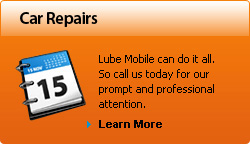Car Safety Tips
Essential Car Safety Devices
When it comes to staying safe on the roads, the best things you can do are to try to be a good driver, always keep an eye on your fellow motorists, and ensure your car has all the best safety measures — because you can?t control other people?s driving. The following is a look at a few car safety devices every car needs to have, so if you don?t have all of these in your vehicle, next time you get an auto service, talk to your mechanic about having some upgrades done.
Air bags
An air bag is one of the most important safety devices you could have in your car, especially if you become involved in a head-on collision. Air bags deploy in a fraction of a second during a heavy impact, and can help prevent you from hitting your head, from being ejected from the vehicle, or from coming into hard contact with side doors or windows. The most common form of air bags are the frontal variety, but rear and side air bags have become increasingly popular, with side air bags proving extremely effective in the case of a rollover.
The Importance of Good Tyres on a Car
There is nothing better than driving a vehicle that was designed to be driven fast and comfortably, so having your own sports car is a dream come true for people who love to drive. To get the most out of your sports car, make sure that you have a decent set of tyres put on it, as a high-performance car needs high-performance tyres. The following looks at just some of the reasons why the tyres on your sports car really do make a difference.
Design
Sports cars are designed with speed and efficiency in mind, so why wouldn?t you want the same from your tyres? Well-designed, high-performance tyres allow you to get the most out of the design of your sports car, without holding it back with sluggish grip and performance.
How Brakes Work and What Can Go Wrong
When driving, pushing down on the brake pedal causes the car to stop. Every driver knows this. Most don’t think twice about what is going on down there, though; it’s simply second nature. But think about it — how is the power of one leg enough to slow down a massive 1.5 tonne car? The answer is, it’s not — at least, not on its own. Ask a mechanic and they’ll explain that your car’s braking system needs to multiply the force from your leg many times before there is enough power to stop the wheels of your car.
The hydraulic system
The braking system in your car works because of hydraulic pressure. When you depress the brake pedal, pressure is applied to a master cylinder located in the engine compartment. This master cylinder contains a piston which applies pressure to the brake fluid. Because brake fluid is incompressible, it acts with as much power as a steel rod, with one key advantage that a steel rod does not possess: it is able to make its way through complex lines that snake around your car. These hydraulic brake lines are connected to each of your vehicle’s wheels, and the fluid from the master cylinder forces pressure on pistons at each wheel. These, in turn, squeezes two brake pads against a disk which is attached to the wheel, causing your car to slow down and eventually stop.
Everyday Safe Driving Tips
Every day when we get behind the wheels of our cars we take control of powerful and potentially lethal machines. This is not something that most of us like to think about. To ignore it though is to risk turning a simple trip to the shops, or to pick up the kids from school, into a life threatening journey. There is no need for panic however; exercising caution, maintaining a good car service history and getting into some good driving habits will reduce your risk of accident dramatically. Here are our top tips for everyday safe driving.
Click Here To Read More
Top Tips for Holiday Driving
Driving is a potentially dangerous activity at any time. It can be even more so when you are on holiday. A new environment and maybe a different car can conspire to make you less effective behind the wheel than usual, and the very fact that you are on holiday can cause you to relax and become a little careless. It is important that you guard against these dangers to keep your car and your family safe. Follow our top tips for holiday driving to reduce the chance of causing injury or having to spend your precious time away organising car repairs.
Click Here To Read More
Five Tips for Safe Long Distance Driving
Long distance driving requires a bit more planning than a quick trip to the shops. Driving for long periods puts extra strain on both car and driver. It is important to acknowledge and take account of this fact, if you are to stay safe and comfortable. Before you embark on your journey make sure that your vehicle is in good condition by undertaking any necessary car repairs and performing a few basic checks. You should also look ahead and pre-empt any problems you are likely to experience on the road. Here are our top five tips for safe long distance driving.
Click Here To Read More
Safe Riding Tips
Although it’s important to always make sure your vehicle has a regular car service, there are other important tips you should know about when riding your bike. It’s easy to underestimate the benefits of a systematic approach to writing a motorbike, but the most experienced riders will tell you that it is a safety first approach which will give you the most enjoyment.
In fact, many of the best writers in the world adopt a systematic approach when it comes to safe riding. This system begins before you even hop on the bike and continues right through your trip. Once you have mastered a few basic facts and adopt a regular routine you will find yourself enjoying a ride even more knowing that you have an automatic safety system in operation.
Click Here To Read More
Safety with Vehicle Chemicals
The next time you take your car in for a car service, spare a thought for the mechanic who has to work with a lot of dangerous chemicals when servicing your vehicle. It might serve as a timely reminder too, because you should exercise the same caution every time you perform some sort of maintenance on your vehicle.
It’s easy to underestimate the dangerous nature of the various fluids and chemicals that go into a regular vehicle service. There are literally dozens if not hundreds of proprietary products that have been specifically designed for a particular purpose, and each of these is to be treated with due respect.
Click Here To Read More
Driving Tips for Slippery Conditions
Even though a regular car service can keep your car in tiptop condition, you still need to be especially prepared for driving in slippery conditions. Whether the slippery conditions are caused by rain, hail, snow, sleet or an oil spill, you need to be more careful than normal.
Here are some tips for making your trip safer when driving in these dangerous conditions.
- Slow down. It goes without saying that driving at speed in any slippery conditions will only add to the danger. Don’t be concerned that you are travelling at lower than normal speeds or that other vehicles around you are travelling faster. You should only drive at a speed you feel comfortable with, especially in such dangerous conditions. Even if you are driving a four-wheel-drive that is built more specifically for these conditions, lowering your speed is still a necessity.




